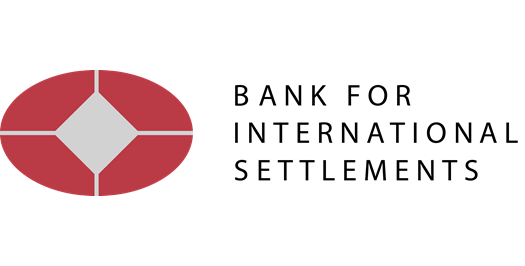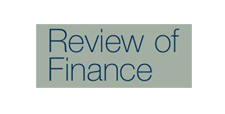Authors submitting a paper to the EFA 2017 can select one track and multiple topics. For information on how to submit a paper, please visit our guidelines page. Students submitting to the Doctoral Tutorial must select the track "Doctoral Tutorial".
Tracks Overview
- BIS - special session
- ECB - special session
- NBIM - special session
- Asset Pricing - Empirical (APE)
- Asset Pricing - Theory (APT)
- Behavioral Finance and Household Finance (BH)
- Corporate Finance and Governance - Theory (CFGT)
- Corporate Finance - Empirical (CFE)
- Corporate Governance - Empirical (CGE)
- Financial Econometrics (FE)
- Financial Intermediation and Institutions - Empirical (FIIE)
- Financial Intermediation and Institutions - Theory (FIIT)
- Financial Markets General (FMG)
- International Finance (IF)
- Doctoral Tutorial
BIS - special session

The Bank for International Settlements (BIS) encourages the submission of papers on the topic:
Financial innovation and changes in markets‘ infrastructure
- Fintech and the role of digital innovation
- The role of non-bank players
- Evolution of market liquidity
ECB - special session

The European Central Bank (ECB) encourages submissions of papers related to one or several of the following topics:
Impact of negative interest rates on
- Bank balance sheets
- Bank lending and risk-taking behavior
- Bank profitability
Optimal design of post-crisis central banks’ operational frameworks
- Collateral policy
- Monetary policy implementation
- Size and composition of central banks’ balance sheet
NBIM - special session
 Norges Bank Investment Management (NBIM) encourages the submission of papers on the topic:
Norges Bank Investment Management (NBIM) encourages the submission of papers on the topic:
Understanding the long-run drivers of asset prices
- Asset pricing in an international context
- Institutional investor demand, lending supply and asset prices
- Tradable risk factors and their links to the macro economy
We welcome theoretical and empirical papers aiming to understand the longer-run determinants of asset prices, especially in an international context.
Asset Pricing - Empirical (APE)
- Equities: Prices and returns
- Stock return anomalies
- Return predictability
- Factor models
- Tests of asset pricing models
- Market efficiency
- Portfolio choice, investments, asset allocation
- Monetary and macroeconomic effects
- Institutional effects
- Financial crisis
- Government policy and regulation
- Leverage effects
- Liquidity, frictions, limits to arbitrage
- Learning, information processing and transmission
- Volatility, risk management
- Fixed income securities: prices and returns
- Commodities: prices and returns
- Derivatives and continuous-time models
Asset Pricing - Theory (APT)
- General
- Equities
- Market efficiency
- Portfolio choice, investments, asset allocation
- Asset returns in macroeconomic models
- Government policy and regulation
- Monetary and macroeconomic effects
- Leverage effects
- Liquidity, frictions, limits to arbitrage
- Learning, information processing and transmission
- Volatility, risk management
- Fixed income securities: prices and returns
- Commodities
- Derivatives, continuous-time, and mathematical finance
Behavioral Finance and Household Finance (BH)
- Empirical
- Theoretical
- Asset pricing
- Corporate finance
- Financial intermediation
- Experimental and neuro finance
- Individual traders/trading strategies
- Households
- Underlying principles
Corporate Finance and Governance - Theory (CFGT)
- Mergers & acquisitions, restructuring, product markets
- Capital structure, financing policy, security design
- Ownership structure
- Contract and game theoretical models
- Dynamic models
- Corporate disclosure, accounting, law, regulation
- Financial risk and risk management
- Investment policy, capital budgeting, cost of capital, valuation
- Security issues
- CEOs, boards, executive compensation
- Governance theory-general
Corporate Finance - Empirical (CFE)
- Capital structure, financing policy
- Security design
- Payout policy
- Testing theoretical models
- Event studies
- Product markets
- Effects of regulation and monetary policy
- Financial risk and risk management
- Investment policy, capital budgeting
- Cost of capital, valuation
- Financial constraints
- Taxes
- Patents and innovation
- Security issues
Corporate Governance - Empirical (CGE)
- Mergers, acquisitions, corporate control
- Restructuring, organizational structure
- Board composition and structure
- Managerial compensation
- Corporations and human capital
- Governance - other
- Risk management
- Ownership structure
- Investor activists
- Financial distress, bankruptcy, liquidation
- Contracting mechanisms
- Corporate disclosure and accounting
- Politics and regulation
- Product markets
Financial Econometrics (FE)
- Model testing
- Quasi-experimental research designs
- Time series
- Volatility and correlations
- Other
Financial Intermediation and Institutions - Empirical (FIIE)
- Banks and depository institutions
- Bank lending
- Central banks
- Ratings and rating agencies
- Financial stability and systemic risk
- Bank regulation and supervision
- Bank risk management
- Collateral
- Investment banking, venture capital, private equity, brokerage
- Financial instruments
- Analysts
- Asset management, mutual funds
- Hedge funds
- Pension funds, endowment funds
- Insurance
- Financial history
Financial Intermediation and Institutions - Theory (FIIT)
- Contract and game theoretical models
- Dynamic models
- Banks and depository institutions
- Central banks
- Financial stability and systemic risk
- Bank regulation and supervision
- Money, credit, collateral
- Investment banking, venture capital, private equity, brokerage, analysts
- Financial instruments
- Market design
- Funds and asset management
- Intermediation and institutions vs markets
- Other financial institutions
Financial Markets General (FMG)
- Empirical
- Theoretical
- Equities
- Fixed income markets
- Commodities
- Interbank, money and repo markets
- Real estate markets
- Other financial markets
- Information
- Market efficiency
- Volume, returns
- Volatility and correlations
- Market linkages
- Financial crises
- Macroeconomic effects
- Monetary and central bank effects
- Institutional effects
- Government policy and regulation
- Microstructure general
- High-frequency trading
- Liquidity, frictions, limits to arbitrage
- Market structure and design issues
- Price formation and Price discovery
- Information and disclosure
International Finance (IF)
- Emerging markets
- Exchange rates
- International asset pricing
- International corporate finance
- International institutions and intermediation
- Stock, bond, and currency dynamics
- Other
Doctoral Tutorial
Students can choose among all tracks and topics listed above, excluding special sessions.
















